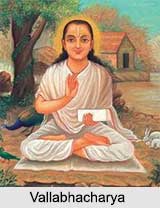 Vallabhacharya was the founder of the Vaishnavite cult of Rajasthan and Gujarat. He was a devotional philosopher, who founded the Pushti sect and the philosophy of Shuddha Advaita in India. He was a contemporary of Sri Chaitanya Mahaprabhu. He composed many philosophical and devotional books. His impression on the public was an embodiment of knowledge.
Vallabhacharya was the founder of the Vaishnavite cult of Rajasthan and Gujarat. He was a devotional philosopher, who founded the Pushti sect and the philosophy of Shuddha Advaita in India. He was a contemporary of Sri Chaitanya Mahaprabhu. He composed many philosophical and devotional books. His impression on the public was an embodiment of knowledge.
Life of Vallabhacharya
Vallabhacharya was born in 1479 AD to Lakshmana Bhatta and Illamma. He was a Tailang Brahman belonging to the Telugu region but was born in Banaras. He received Sanskrit education. He started his education at the age of 7 years by studying four Vedas. He mastered the six systems of Indian philosophy. He also learnt philosophical systems of Adi Shankaracharya, Ramanuja, Madhvacharya, Nimbarka along with the Buddhist and Jain schools.
He travelled throughout India meeting several scholars. He called himself an incarnation of the Lord Agni. He had not acknowledged any human teacher. He says that he had learnt his system direct from Lord Krishna. He preached the worship of Lord Vishnu in the form of Krishna. Philosophically his school is called "Shuddha Advaita" meaning pure monism. To him, Bhakti was not only a means but an end also. According to him Bhakti is given by God. The released souls rise to Lord Krishna"s heaven or Vyapi-Vaikuntha. In the heaven there is also Vrindavan where Radha, Gopis and Gopas reside. He visited Mathura, Vrindavan and many other sacred places and finally settled at Banaras.
Teachings of Vallabhacharya
Vallabhacharya taught that there was no distinction between Brahmin and the individual soul and the latter could get rid of bondage by Bhakti. He asked his followers to offer everything in the service of Krishna. According to Vallabhacharya only individuals who have the grace of Krishna can be successful in the path of devotion. He advocated the worship of idols of Krishna. Later the rituals of this sect became very complicated. Many followers of Vallabhacharya composed poems on Krishna in Hindi language and thus contributed greatly to the spread of Krishna cult.
The Krishna cult is called, `seva` and also known as Pushtimarga. Pushtimarga, the path of divine grace is based on the "Vishudhadvaita" philosophy, initially shown by Shri Vallabhacharya. He strongly suggested that Lord Shri Krishna is the ultimate God. Thus, Shri Krishna`s blessings alone and only can free humans from the painful cycle of birth and death.
Works of Vallabhacharya
Shri Vallabhacharya wrote many books, but many of them are not available today due to lack of proper perseverance. The important works of Vallabhacharya are "Vyasa Sutra Bhashya", "Jaimini Sutra Bhasya", "Bhagavata Tika Subodhini", "Pushti Pravala Maryada" and "Siddhanta Rahasya". All these books are in Sanskrit. Vallabhacharya has written many books in Brij Bhasha also.
Vallabhacharya spent his last days at Varanasi. He thought that his life"s mission had been accomplished. In the presence of a host of spectators he ascended the sky and disappeared. Shri Vallabhacharya breathed his last in the year 1531.









